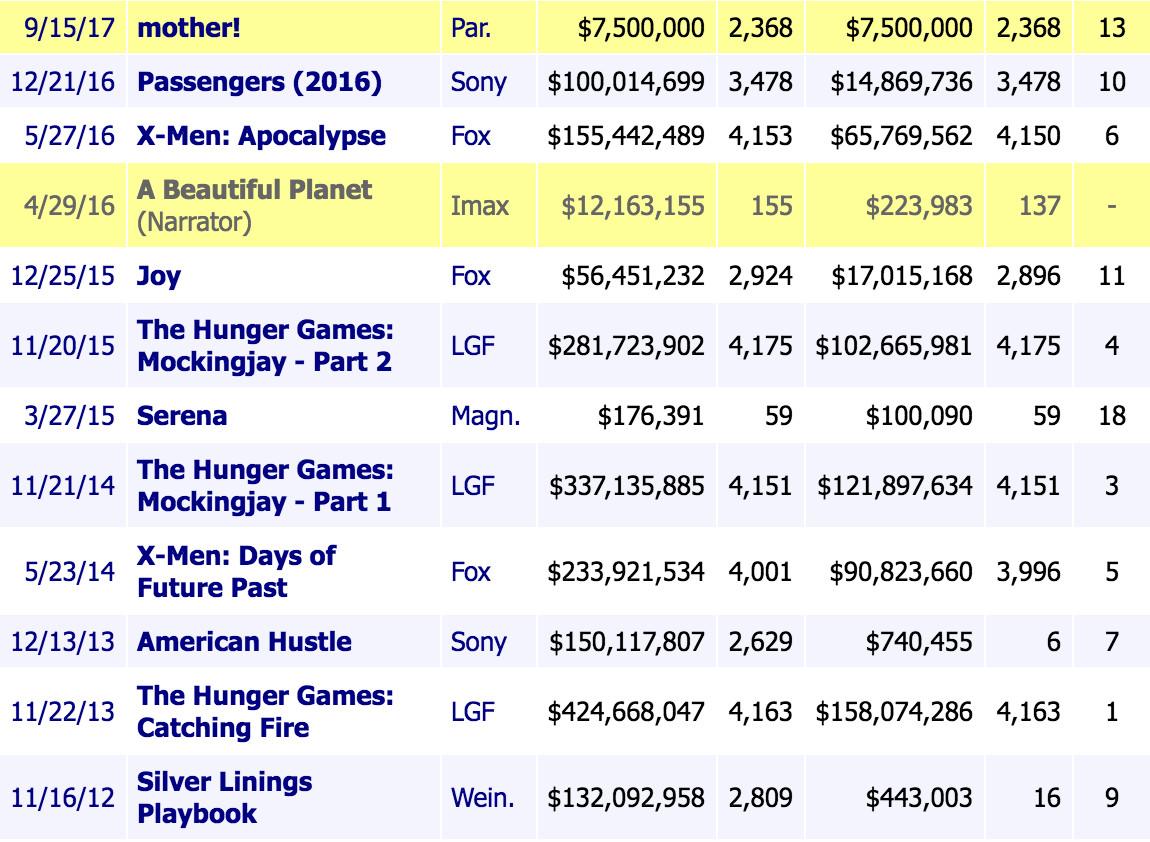
“That is the worst movie I have ever seen in my life.”
These words were uttered loudly in a theater this weekend. More than one, in fact. More often than not, they could be heard in theaters showing Darren Aronofsky’s latest film, Mother!. We know, in such short order, that Mother! is reviled because it earned a rare F grade from CinemaScore, the first-day exit polling service that tracks audience reaction. There have been just 12 F scores this century, a ramshackle group that includes Robert Altman’s Dr. T & the Women, the 2009 period piece horror-thriller The Box, and Steven Soderbergh’s notorious remake of Solaris.
What Mother! shares with the bulk of these films, and what typically drives this kind of negative reaction, is a sense of bait-and-switch among audiences. Those polled typically have wandered into theaters expecting something different, like, say, a frisky Richard Gere rom-com and instead found a distraught gynecologist’s existential wail made by an aging auteur. But unlike these forebearers, Mother! was not disingenuously marketed — it was hardly marketed at all. Aronofsky, whose work typically revels in a kind of high-toned camp mania, sought secrecy in the lead-up to the film’s release, despite the teasing and long-runway marketing that goes into most major studio releases. It’s not difficult to understand why Aronofsky made this choice. Despite its provence at Paramount Pictures and a $30 million budget, Mother! is an operatically strange and disorienting film, difficult by necessity and unnerving by design. The Ringer’s K. Austin Collins describes Aronofsky’s provocations as “mischief.” The New York Times’ A.O. Scott says it’s “a hoot!” The ever-astringent Rex Reed plainly calls Mother! the “worst movie of the century.” (That’s his kicker!) This is really something special. And not because of the divergence of opinion — movies split audiences and critics with the frequency of the sunrise. But hardly ever with such rancor, such feeling. Mother! is the first freakout, the first emotional crisis at the movies in some time. After a screening I attended this weekend, it was simply delightful to hear the sighs and declamations of patrons outside the theater. These people cared. “I didn’t like that at all. Stupid, pretentious crap.” “It was so, so, sooooo loud.” “Was it annoying on purpose?”
So what is it? The story of Mother! is purely allegorical, though it does not begin that way. Jennifer Lawrence plays the titular Mother, a quiet, anxious woman who dotes on her poet-artist husband, played by Javier Bardem. She is restoring their house, which we learn has been badly damaged in a fire. Bardem’s character, who is identified only as Him, is blocked, incapable of creating. Suddenly, a man — called simply Man — raps at the door in the middle of the night. It’s Ed Harris, and he is an orthopedic surgeon who has just arrived in town and mistook the house for a bed and breakfast. Soon, the men are drinking and laughing and carrying on, to Mother’s chagrin. She begins to experience spells of dizziness, takes a tincture, and goes to bed. The Man eventually becomes ill, and can be seen bleeding from his back while vomiting. The following morning, all is eerily well again, and there is another rap at the door. It’s Michelle Pfeiffer, in all her ravishingly contemptuous glory. She is the Man’s partner, Woman, and she is unafraid to gallivant through Mother’s home, peering into every nook and cranny, whether physical or psychological. She asks probing, inappropriate questions. She lustily pets her ailing partner. She gulps vodka lemonades like they’re going out of style. Bardem’s character asks Man and Woman to stay in their house as long as they like — Mother is quietly horrified by the prospect. Soon, Man and Woman are upstairs copulating, and there is another rap at the door. More unexpected visitors. A theme is emerging here. It’s about this moment when the allegory starts to take hold and the grumbling in theaters begins.
What follows is one of most chaotic, bracing films of recent memory, as Aronofsky strafes the screen with imagery that struck me as blunt, hammerheaded metaphor. A bursting sink is a biblical flood. A leaping frog is a portent of a plague. A bleeding, rotting hole on the floor is original sin. A war of belief raging under the roof of one house. Flesh torn from flesh. Fire, fight, and rape. As the movie grows more intense and more destructive, it becomes more unpleasant to watch — but also suitably enrapturing. I can’t recall the last time revulsion and fascination commingled with such fury. It’s a cocktail of convulsion.
That this film was funded by a major American studio and stars the woman who can still be credibly described — or, at least, could until last Friday — as America’s Sweetheart is a small marvel. Mainstream movies released by corporations, by their very nature, are meant to offend as few people as possible. The mainstream is meant for the main. This thinking, in many ways, has reinforced a crisis of strategy in Hollywood. In short: If a Transformers movie makes money, make more Transformers movies and less of movies that are not Transformers movies. But there are, obviously, flaws in this rationale. This summer, that feeling was acute, as box office receipts dipped and cultural focus leaned ever south to the waterfall of streaming services.
I’ve spent the past year intermittently chronicling the challenges Hollywood faces. The most frequent complaint comes in the form of a lament for a time when original stories, rom-coms, serious dramas, and mid-tier thrillers reigned — a time when movies were king and choice at the multiplex was vast. This is a modest request — few filmmakers, executives, or cinephiles could even imagine a studio serving up a movie like Mother! in 2,000-plus theaters in 2017. These projects have become the domain of Netflix and Amazon. But that’s just what Paramount did for Aronofsky, three and a half years removed from the vaguely catastrophic Noah, a not-much-liked reimagining of the Bible tale. But Noah, a film whose tumultuous production was elegantly rendered and dismantled by Tad Friend in The New Yorker, still made quite a sum — $363 million worldwide. Despite the perception, that is not a flop, not close. So, perhaps with the twin successes of Noah and 2010’s shocking hit Black Swan, Aronofsky sensed some daylight and took a radical swing.
That he did so with Lawrence, the 27-year-old Oscar-winning actress, has given the Mother! freakout an added frisson. Since winning her Academy Award for 2012’s Silver Linings Playbook, Lawrence’s career has played out in rambunctious, contradictory fashion, employing a one for them–one for them–one for David O. Russell strategy that has struck me as curious tipping toward downright confounding.

Mother! subverts some of the more unfortunate choices in recent times, including a contractually obligated tie to an expiring X-Men franchise, and an unnecessarily elongated Hunger Games extension. Lawrence’s “art” films have included two reunions with Russell, her Oscar-aiding director (including the barely seen mistake Joy), and Passengers, about which the less said the better. Lawrence’s career was by no means in peril, but it had certainly lost its identity. The flinty, relatable actress first emerged in a fierce performance in 2010’s Winter’s Bone before stumbling up the steps on the way to receive her Oscar three short years later. Today, she drinks wine and gleefully recounts getting into bar fights on talk shows. People really, really like her. Unless they don’t. Lawrence has a defined public shtick but a cracked professional compass. Teaming with her boyfriend — she and Aronofsky are reportedly dating — to make a movie that potentially revolts people, offends Christians, and taunts climate-change deniers is an inspired and compelling choice. It’s the sort of thing admirable artists do with their great privilege: make wild, boundary-collapsing work. That Lawrence’s character and performance are at first so blank and then such a shrieking berserker makes it doubly fascinating. She is locked in close-up for 66 minutes of the movie’s 121-minute run time. Her face is the story here. But Mother! made just $7.5 million this weekend, the biggest wide-release disappointment yet for Lawrence. Many of those who have seen it — whether engaged by the incendiary allusions or not — likely hate it.
Of course, that’s the point, I think. Aronofsky and Lawrence have made a movie about a woman who is overlooked, undermined, used, and abused. The risk is entirely Lawrence’s. Aronofsky is understood to be a provocateur with a complicated relationship to religion and womanhood. This movie isn’t a surprise for him, gut-ripping though it may be. It demands reaction, it drives a kind of frustration and divisiveness that movies haven’t stoked in years. But for Lawrence — and what this woman is meant to represent and what it could mean for the rest of her career — it is something else entirely. Is she Mother Earth? Yes. Is she God’s wife? Yes. Is she all of the suffering women forced to endure the feckless fragility of their artist-husbands? Yes, to the heavens. Mother! is an awful experience and an amazing movie. Or maybe it’s the other way around. In other words: It’s a miracle.
